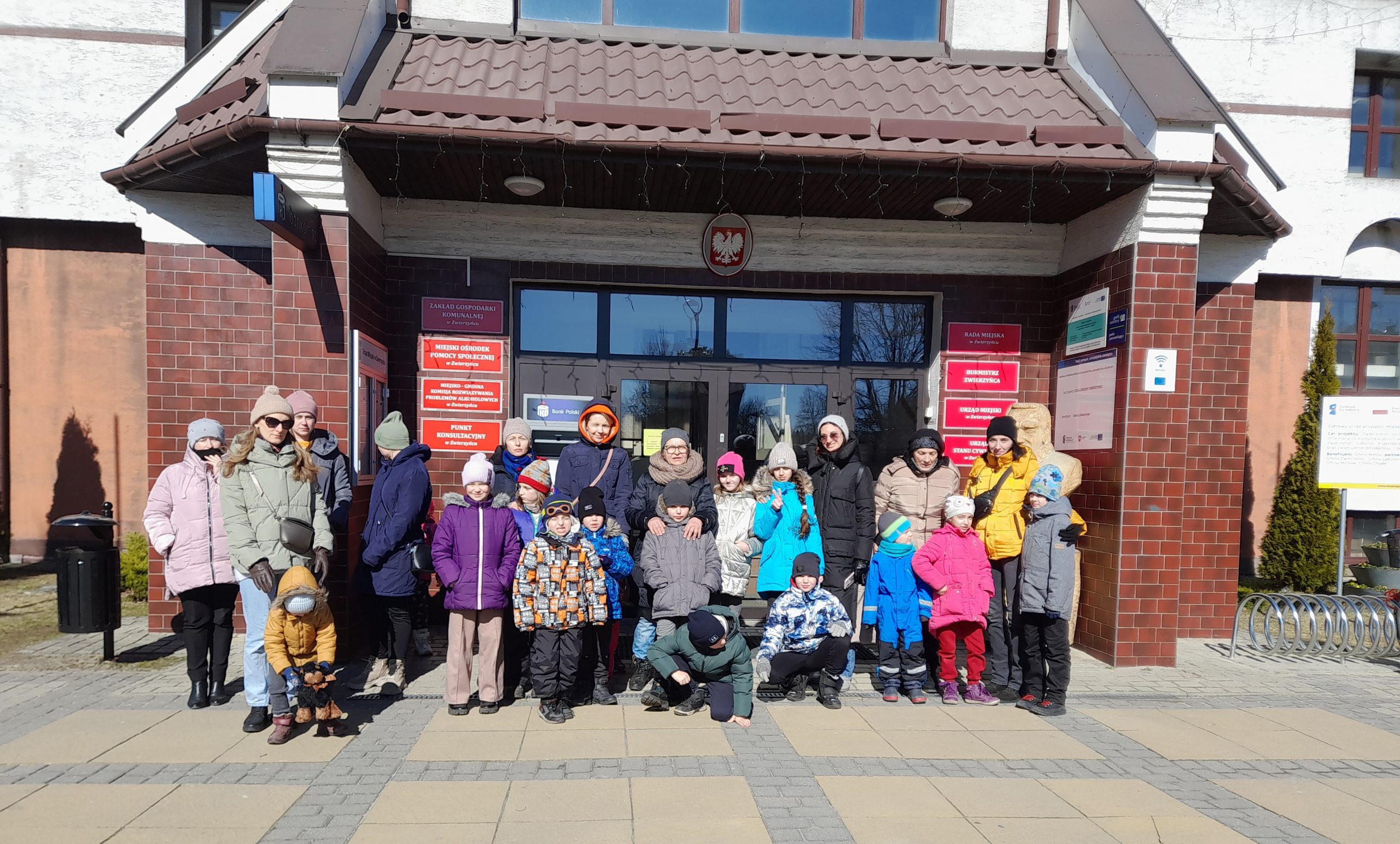
News – women’s Polish – Ukrainian front line
Zwierzyniec 2022 (2nd to 11th of March)
Bread and beetroot instant soup…
Wednesday, 2 March 2022
There is Russian – Ukrainian war going on and Ukrainian civils are fleeing massively. Only one week and a half I returned from the UK and I’m about to be released from my self-isolation after I caught covid. Then I go out and see clearly that something has changed in my town. I hear Ukrainian language in a local shop, I see first lost women, buying some bread and instant soups, mainly beetroot soup.
Many questions about different issues relating our guests appear on Facebook. I find an offer for people who want to become volunteers and are willing to help. I go to a meeting. Then I come back – eager to work!
The mayor of the Zwierzyniec town, Urszula Kolman, informs us about some issues relating the refugees. Some of them have already been given place in a boarding school in Zwierzyniec. They are families of some students attending this secondary school! It is them who are here now while a few adult school’s students have gone to Ukraine for a school break! And now they have been called up for military service. Their mothers and sisters are crying all the time.
First orphans
Zwierzyniec is expecting more refugees. At the board somebody is already waiting for a group of orphans who should arrive at night. Even more children are to come a few days later. We do have space but nothing but that. So we ask residents for help. Beds for the orphans are collected and transported to the place where the children will be staying. Local firemen are helping. Local women prepare the place, trying to make it friendly and safe. Volunteers will greet the little refugees and offer help.
In the morning we receive information that 15 children and 3 guardians came. The children turn out to have disabilities. Their needs are special. Fortunately, people help by bringing necessary stuff – clothes, shoes, medications.
The foundation Fundacja Honor Pomagania Dzieciom (the foundation Honour of Helping Children) cares about our new guests.
Some volunteers do art lessons with children. Others conduct sensory therapy and drama.
We observe muscle tension in many orphans.
We need adult diapers, orthopaedic mattresses and gravity blankets. These are relatively expensive when compared to regular sheets. So I am sending a request to my friends living in UK.
War sound
Zwierzyniec is expecting another group of orphans who should have arrived by the end of the week. They have not. The darkest visions are creeping. We think what could have happened to the children travelling from East Ukraine… These visions are incited by media – by relations from the Ukraine border areas about bribes, rapes and human trafficking…
Every night we wake up from nightmares. At dawn we hear a strange sound of airplanes. They fly low. There are quite a few of them. This reminds me of my grandparent’s war stories about bombarding and the fear they felt when heard the airplane sound…
At 5 o clock in the morning we check news – being afraid that the war could have come already to Poland. Fortunately, it turns out that it’s only patrols and border service of the American Army units, located near Zamość.
Our next meeting delivers new information and challenges. We find out that the orphans we were expecting had been directed to the North Poland. However, the great number of refugees who arrived in the meantime took most of the space we had prepared for them. Therefore, the Villa Rózin, a former orphanage has become a temporary home for some women and children. It was named after Rose Zamoyska who saved hundreds of children from concentration camps during the Second World War… Summer houses have also been occupied by refugees.
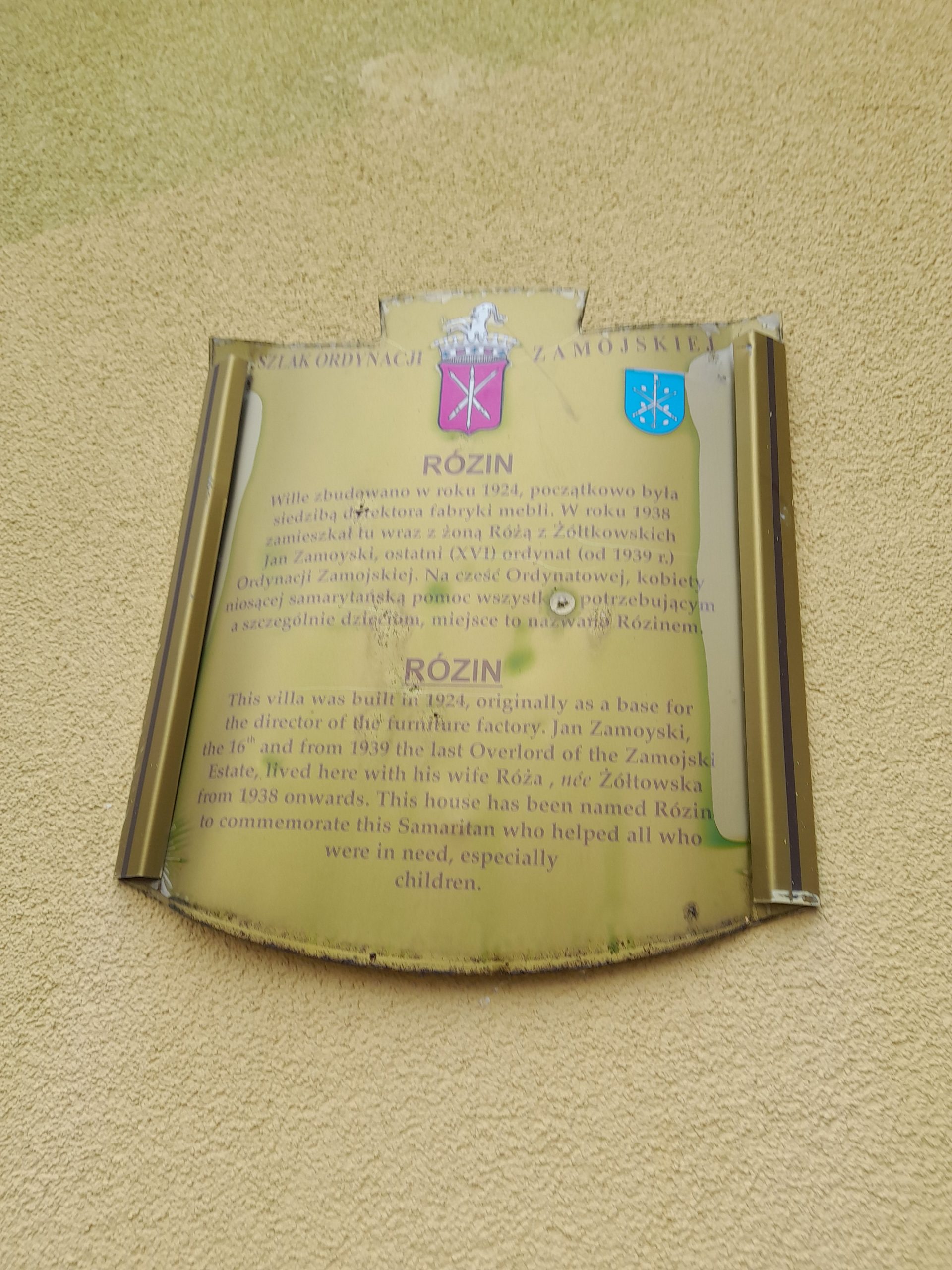
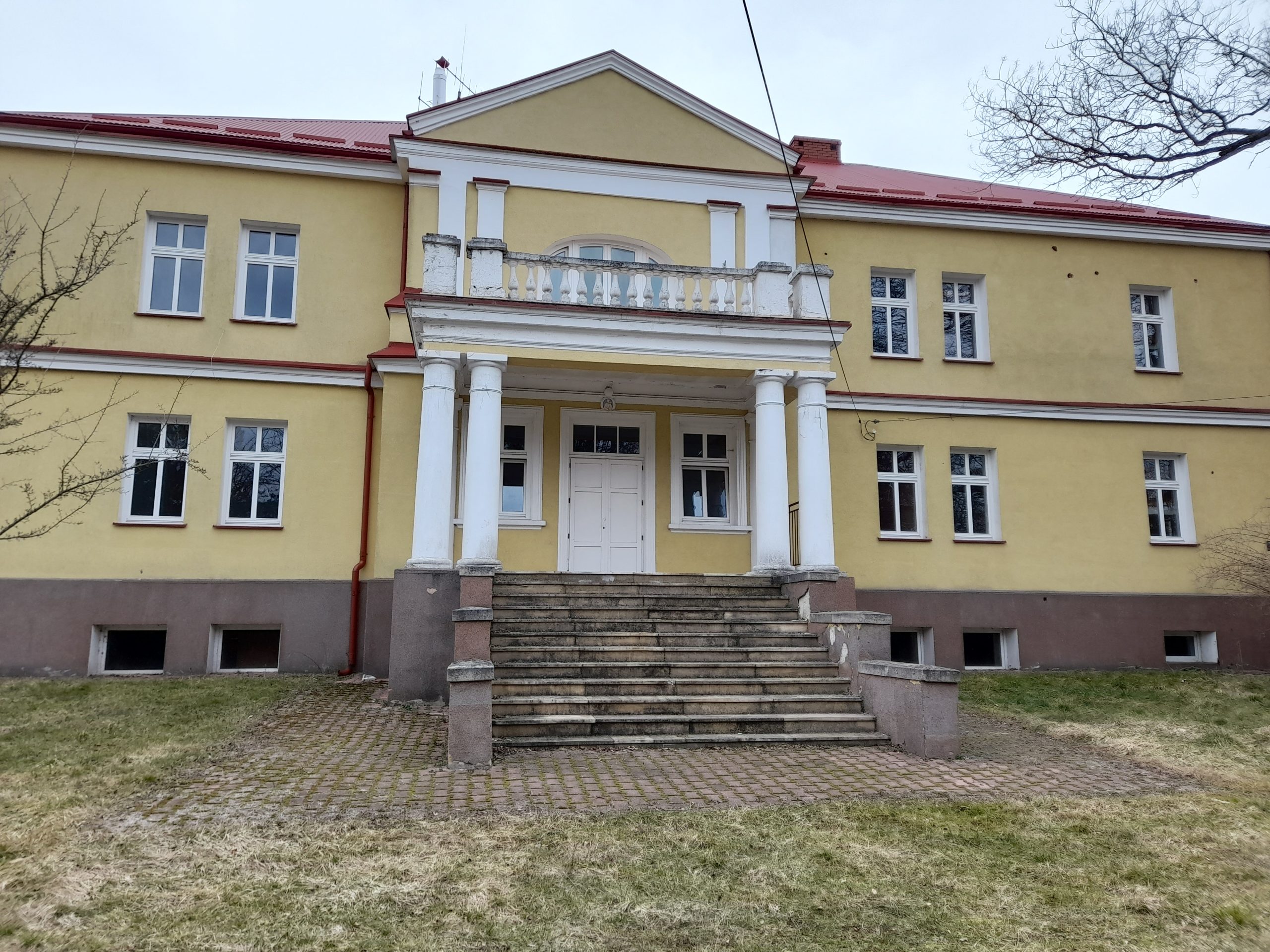
Ukrainian…
We are talking about the need of integration among the Ukrainian refugees. They are people from different parts of the country, having various experiences. Some of them came from Kiev but others only heard about the war going on, but never saw it.
The sound of the sirens, silent running to bunkers, packing the most useful stuff and going to Poland.
In Poland they were welcomed warmly. Stuff offered by people – clothes, shoes, diapers, food. Children, not being always aware of what is going on, want to go home. But their home has to be here for now. And it is! The Culture Centre and the Library of Zwierzyniec offer space for meetings. I’m thinking of creating some “Ukrainian Saturday School” modelled on Polish schools in England (in UK pupils and students of Polish origination often attend Saturday schools – translator’s note). My idea is not clear to the volunteers. People deliver food and clothes and I am asking for Ukrainian books, musical instruments and art materials. Finally I receive a “benefit of the doubt” to create the school. I am recruiting volunteers constantly. Polish mainly but some Ukrainian also started applying. I don’t know their skills, abilities, knowledge but we need to try. I ask them to lead some integration games for the children.
On Monday, the 7th of March, 7 children with their guardians come to the Culture Centre. The institution is very well prepared to host them. Some treats are already waiting – tea, coffee, biscuits. Books and art materials are ready to be used. One of the Ukrainian moms finds herself perfectly well in the role of an animator! Another, a choreograph, teaches movement and dance. All the children and mothers are involved in the activities. Smiles and thanks appear. Olena, who studied Polish philology, helps in interpreting. Leaflets about the activities for children are printed.
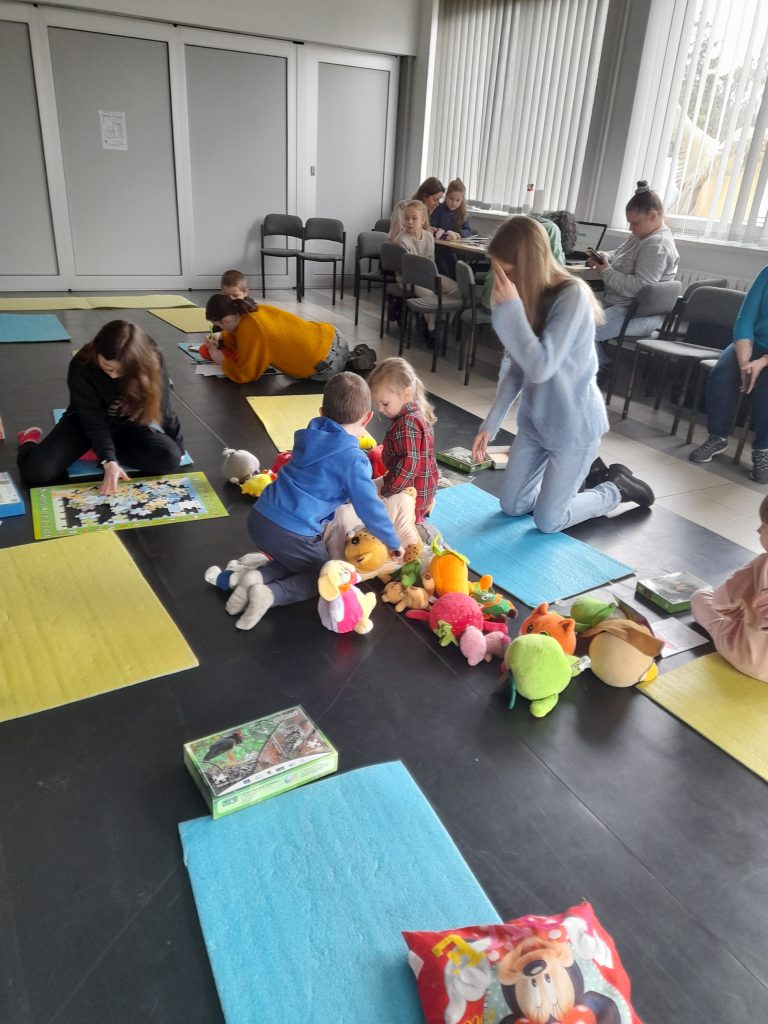
Emotional International Women Day
I am going to the Villa Rózin to see who is staying there instead of the orphans who went to the North Poland. There are over 30 women and children. Not only mothers but also grandmothers who take care of their grandchildren. They need as much help as the orphans.
The women tell me about their plans. Some of them are planning to continue travelling from Poland somewhere else, one has family in Bulgaria, some of them would like to come back home after the war is over. The young mothers from Kiev don’t say anything…
It’s Tuesday, the 8th of March. A lot of children come to the Culture Centre. The volunteering Ukrainians organised everything perfectly. When the children are watching a movie in our Polish-Ukrainian “cinema”, their mothers are choosing stuff they need from what people brought – shoes, clothes, food. They cry as it’s a hard day for them. They appreciate our help but remember about the Women’s Day. In Ukrainian calendars it is marked in red and is the day when gentlemen give flowers to ladies. So I go to a flower shop nearby and buy yellow tulips for them. So words needed. We can hear both laughter and crying.
Plenty is no plague, but…
Some volunteers went to Obrocz (a village near Zwierzyniec – translator’s note) to deliver the refugees who are staying there some food but were not let in. The people living there were afraid of letting anybody in. Fortunately, one of the mothers present in the Culture Centre is staying in Obrocz and offers to walk to the summer houses and encourage their residents to join us here. It’s 4 kilometres far from the Centre but we can organize transport.
The ”Obrocz operation” turns out to be successful. Around 10 o’clock a lot of mothers with children come to our place. The room is busy. There are over 30 kids. Some of them do art, others dance. Some of them do some work. The older ones tell the younger that they need to go to school. Many of them don’t want to though, they prefer to stay among their countrymates. Or they would like to go home. They know, however, that this can’t happen now and they need to go to school and their parents need to look for some work. They don’t know how hard it might be. Even some local residents struggle to find a job. Many people used to work in tourism, but now? Who would come here for holidays? Some people have already cancelled their bookings others expect that the place has remained the same. War has changed it thought. We don’t know if, in a few weeks, it will be possible to rest in nature, to cycle or do canoeing… These are border areas, so soon we should rather expect more refugees than tourists here… The poor refugees because the ones who can afford traveling, don’t stay here. The rich ones stay in a hotel overnight and then move on. The ones who are staying hope to be able to come back home soon or can’t afford to go somewhere better.
Mothers and grandmothers would like to find out about different places in Zwierzyniec. They often ask about a church. They are orthodox but still eager to come to a Catholic church. They saw a small temple, beautiful, but closed. It’s a church on water, one of the oldest buildings here.

We are planning to take them for a walk around the town and show the most important places. The church, the post office, the school, the surgery, the dentist and the town hall. And also some attractions for children.
The sun is rising
One of our volunteers, Jacek, is able to communicate in Russian and knows also some Ukrainian words. Also, he is trained as a tourist guide so he shows our guests the town. We are starting at the church. It’s a special place for Zwierzyniec. It was built on the area of a transitional camp where, during the Second World War, the German Nazi kept people for further selection – they chose the ones to work and the ones to Majdanek Concentration Camp (near Lublin). In that camp were staying the children whom Rose Zamoyska used to help. Some of them she literally bought from the Germans and took them to her villa in Rózin, which she transformed into an orphanage. Jacek said that she saved his grandmother. I am asking one Ukrainian talented artist, Ludmila, to paint a portrait of Rose Zamoyska. She needs to do it soon as next week she is moving somewhere else.
We continue walking. Some small children struggle. It was cold in the morning but now the sun is high in the sky, so it’s hard to walk wearing warm winter coats and shoes. But we move on. We reach the playground – the final attraction of our trip. A police car is parking at the playground’s gate. Did somebody let them know about our trip?
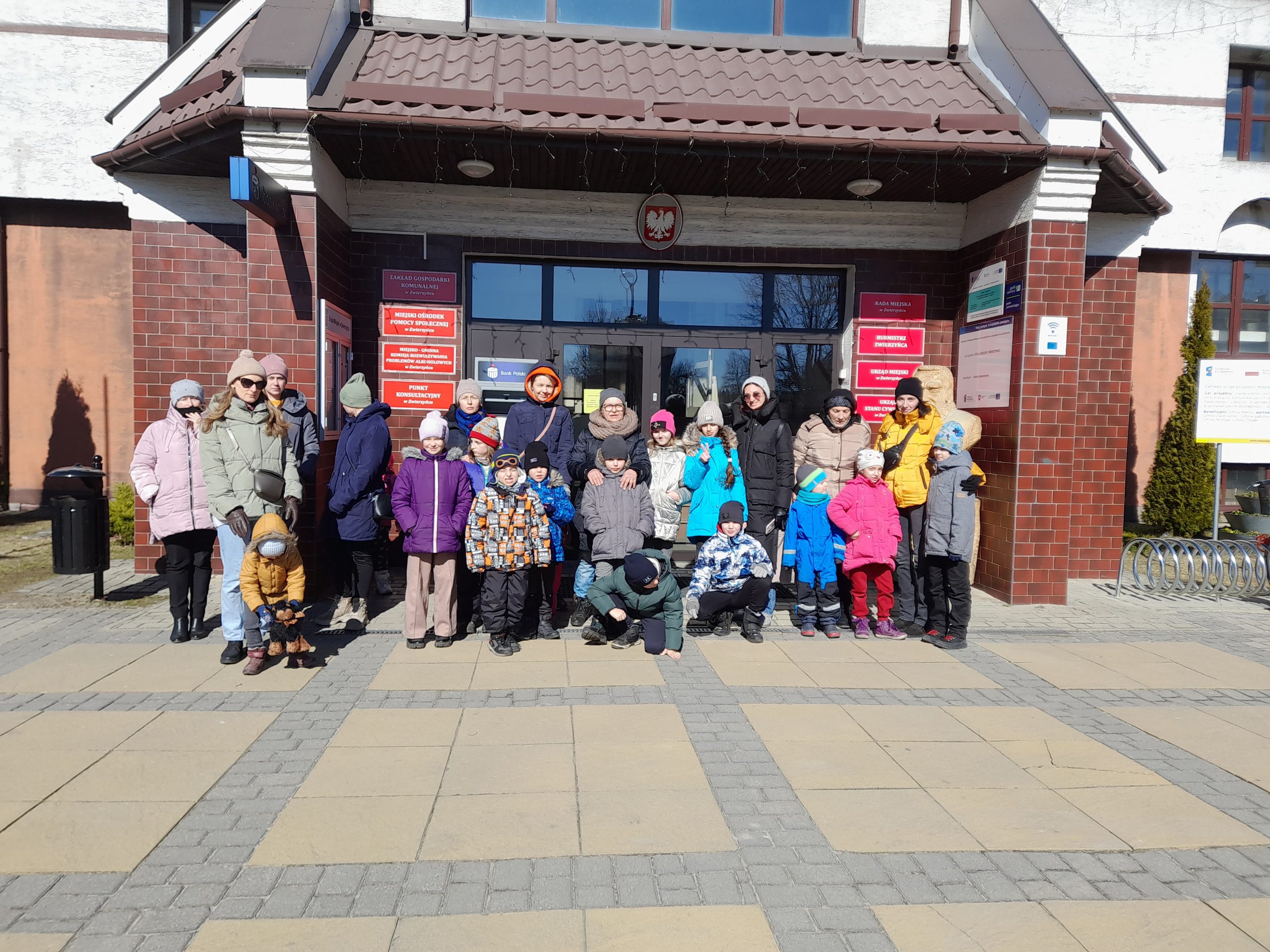
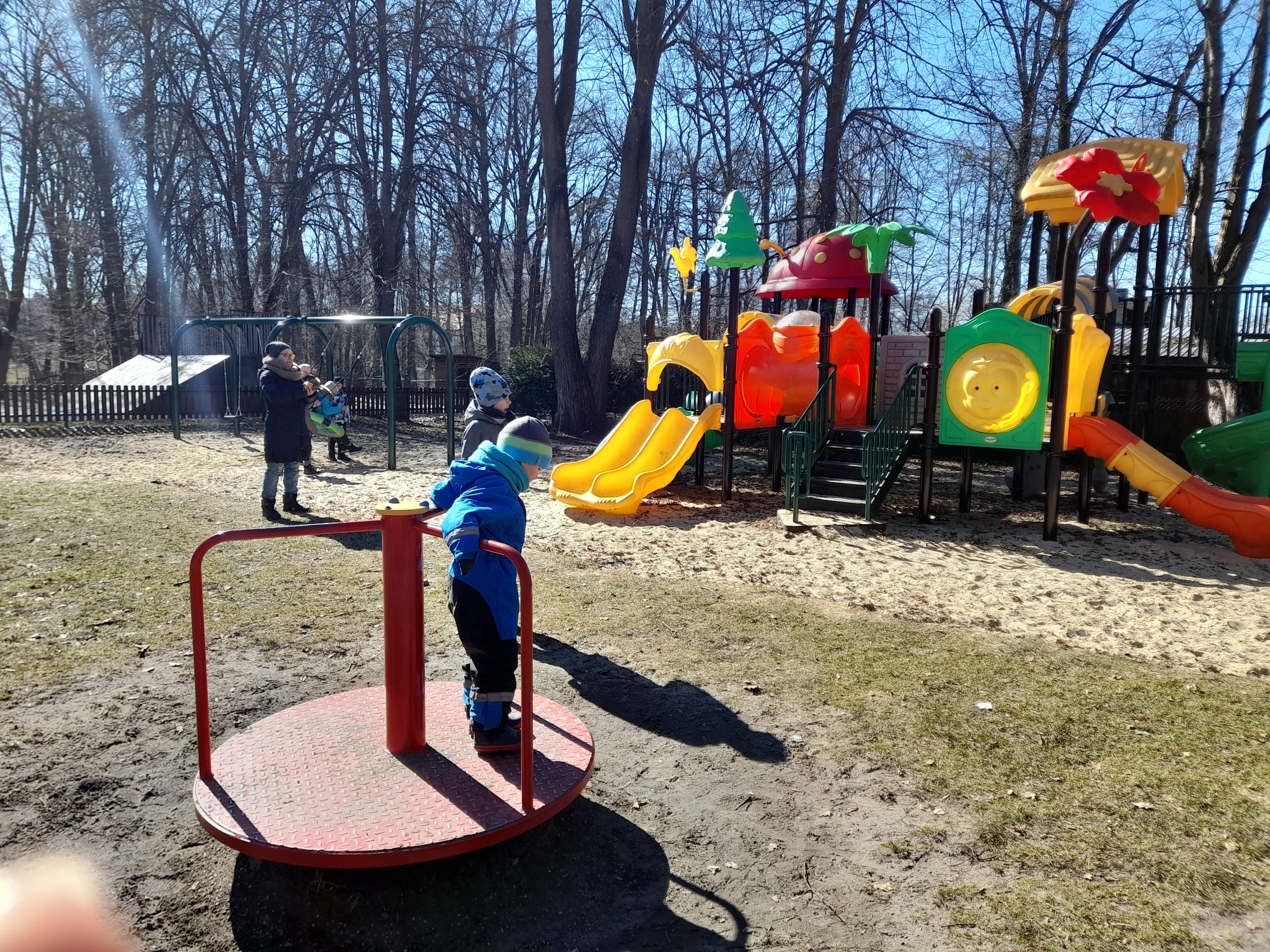
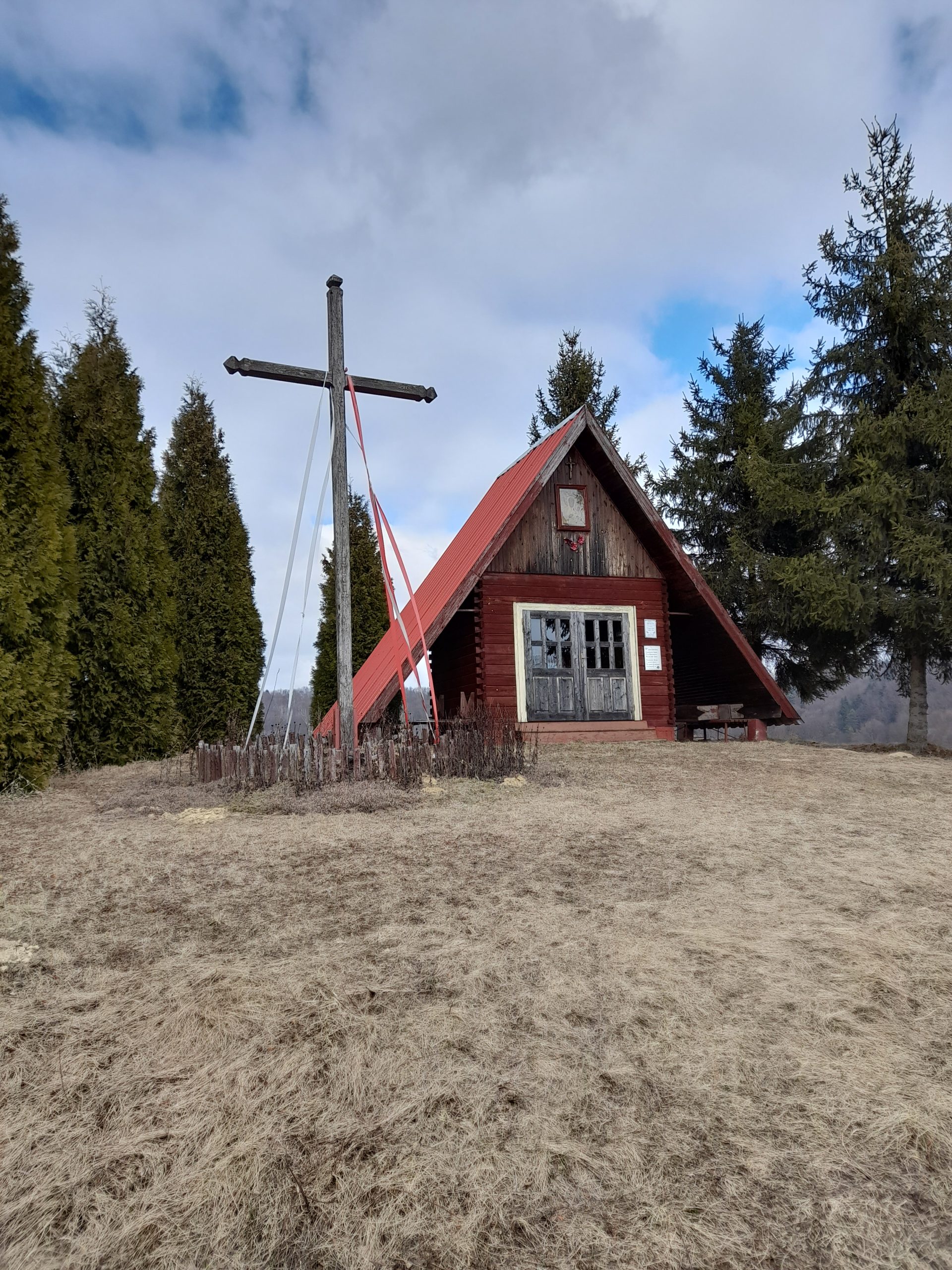
New helpers
New offers of spending time appear. The owner of the popular garden for children “Etno Roztocze” would like to teach do-it-yourself. The issue is that the sets desired for our group are expensive. The first set has already been ordered and paid by a Londoner (https://etnoroztocze.pl/).
Our local bakery delivered the children donuts and bread to be spread with Nutella or jam. Sweet.
Ewa Bartnik from the Society of Active Women in Żurawnica is to conduct workshops of making folk-style flowers. Maybe we could sell some of them on Palm Sunday.
Ladies from the Rural Housewives’ Club of Turzyniec organise donations and transport them. The local residents already made their donations but we have started receiving help from outside. Some transports came from Germany. Some stuff the volunteers sent to Ukraine, some they give away to the refugees staying here. Also, we receive art materials, drinks, snacks. Lists with stuff requests are being created systematically. For example, recently, there was a high demand for shoes and flippers. Especially, that some of the kids are going to school. Volunteer teachers from the local primary school are preparing to conduct Polish language courses. Communication turns out to be an issue though as it is difficult to teach Polish, not knowing Ukrainian language. It’s easier for the ones who speak English or Russian. Implementing the preparatory classes is a challenge for the time coming. The Banin Foundation (https://www.facebook.com/BaninFoundationUK/) is recruiting volunteers to conduct Polish language courses. Some people apply but they come from different cities so it is difficult to use their potential to organise regular lessons here. However, the integrational and movement activities will be carried on. Understanding a language is not necessary for drama or sensory integration therapy, body language works there.
I am trying to find some Polish language teaching books for Ukrainian children and teenagers. I know the British ones but am seeking for some recommendations for teaching Polish the East languages speakers.
How can you help?
I believe that we succeeded as the residents of Zwierzyniec. We reacted very quickly – opened collecting donations points and organised giving them to the ones in need.
These points are placed in:
- Urząd Miejski w Zwierzyńcu (the City Hall in Zwierzyniec)
- Centrum Kultury i Biblioteka Publiczna w Zwierzyńcu (The Culture Centre and the Library of Zwierzyniec)
- Szkoła Podstawowa w Zwierzyńcu (the Primary School in Zwierzyniec)
- Szkoła Podstawowa w Wywłoczce (the Primary School in Wywłoczka)
- Świetlica wiejska w Turzyńcu (The rural club in Turzyniec)
- Świetlica wiejska w Obroczy (The rural club in Obrocz)
- Świetlica wiejska w Sochach (The rural club in Sochy)
If anyone would like to donate – we mostly need food. Also, we need cosmetics for babies, children and women, protective lining for beds, baby and adult diapers.
Moreover, we collect medical supplies and other accessories which we regularly send to the Polish-Ukrainian border and to Ukraine itself. If anybody would like to send these, the best way to do it is to find a collecting point at the border.
One of our most important targets is to organise care for children. This has been promptly met by offering the described activities in the Centre of Culture in Zwierzyniec. The activities happen daily 10.00-13.00. We do need art materials for children (crayons, colour paper, glue sticks, tissue papers, sketching books or printing paper, sponges, craft materials, brushes, paints, plasticine etc. Also, we need some “drama stuff”, like puppets, musical instruments, educational toys/games, games.
We are about to start teaching Polish, so we need notebooks, pens, pencils etc.
Moreover, we would appreciate children books in Ukrainian.
The truth is that the transport of the mentioned above stuff may turn out to be more problematic and expensive than simply transferring money.
As we work under the City Hall in Zwierzyniec (Urząd Miejski w Zwierzyńcu) the preferred form of any financial help is to transfer money onto the bank account:
Fundacja Fundusz Lokalny Ziemi Biłgorajskiej,
ul. 3 Maja 47/17, 23-400 Biłgoraj
BNP Paribas: 48 1600 1462 1866 1079 3000 0001
For outside Poland bank transfers account number:
IBAN: PL48 1600 1462 1866 1079 3000 0001, SWIFT: PPABPLPK
Title (tytuł): ”Darowizna Zwierzyniec dla Ukrainy” or ”Zwierzyniec Ukraina”
Observations relating the first week of the activities for the Ukrainian children
The children’s attachment to their motherland is amazing. We hear a lot of Ukrainian songs. They are modern, so the children are eager to sing them and dance.
The children have been obviously thought with use of activation methods, including dance and music.
Our Zwierzyniec group includes quite a few great and well educated animators. Julia is a choreographer, her mother conducted activities in the Ukrainian Centre of Culture, Anna plays the piano, Ludmila is an artist. Irina, a computer expert, is planning and organising everything. Olena helps in interpreting.
Some of the children are talented in music or art. They are also courageous, cooperative and disciplined. The Ukrainian mothers and grandmothers eagerly participate in children’s activities and parties.
The children enjoy listening when a book is read aloud. They even ask for the reading themselves. Sadly, we don’t have any Ukrainian books. Therefore, if anyone would like donate them, we will really appreciate! We will leave them in the Culture Centre instead of giving them away, so the children could use them here. Alternatively, we might create a library and borrow the books the families who will remain in Zwierzyniec.
Some posttraumatic muscle tension have been observed at some children. Therefore, if you would like to donate a blanket or a duvet – please, buy a gravity one.
The local authorities support us – the mayor Urszula Kolman and the secretary Edyta Wolanin. The ladies receive and transport the donations, talk in person to the refugees and the volunteers. The secretary even selected clothes and polished children shoes!
Most of the helpers are women. However, we have a few supportive gentlemen as well. Firstly, our husbands have overtaken our chores at home. Also, we have some male volunteers on the spot. The walk around Zwierzyniec organised an engineer, Jacek. All the transport and unloading is managed by men, including the local firemen.
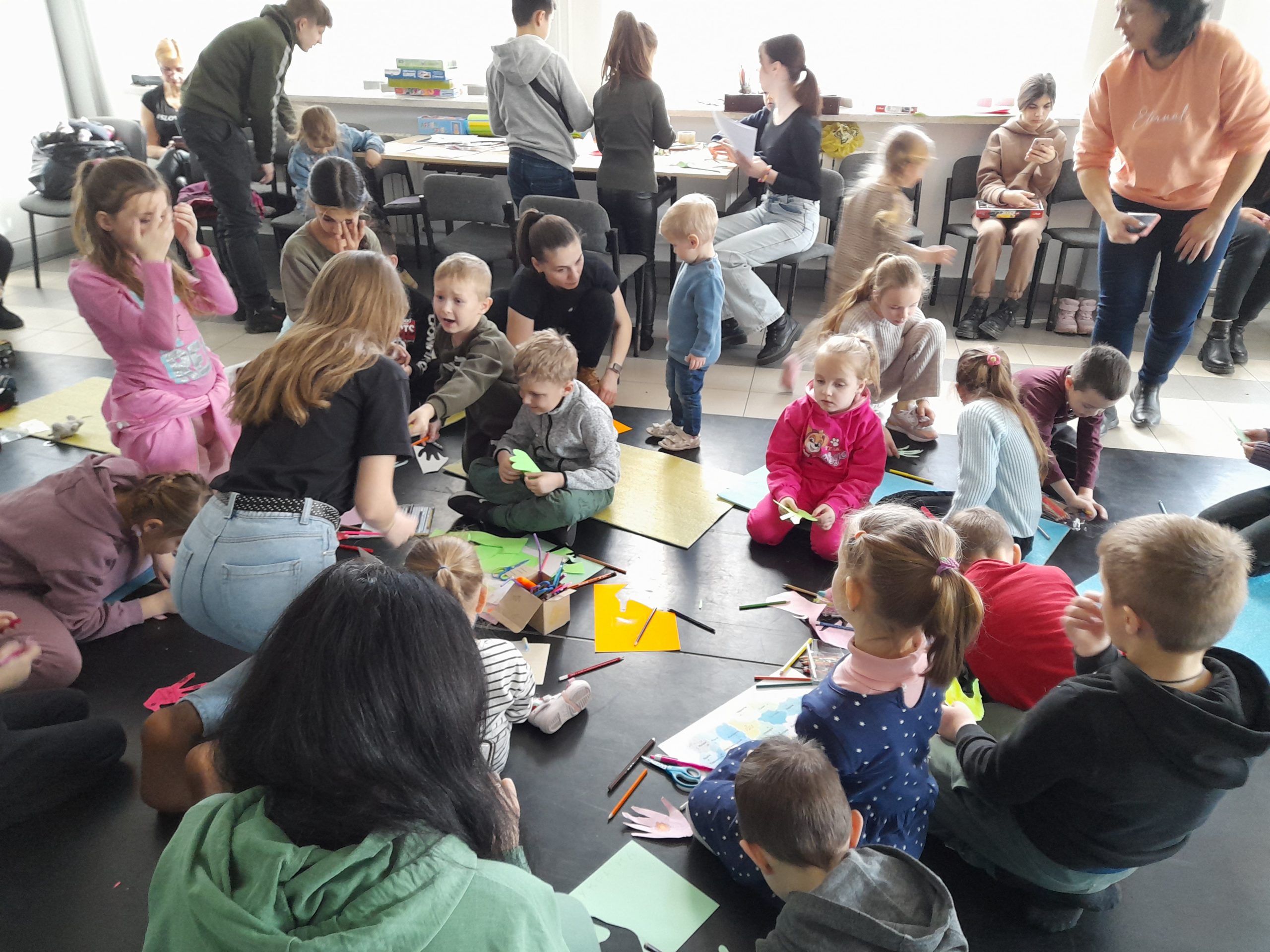
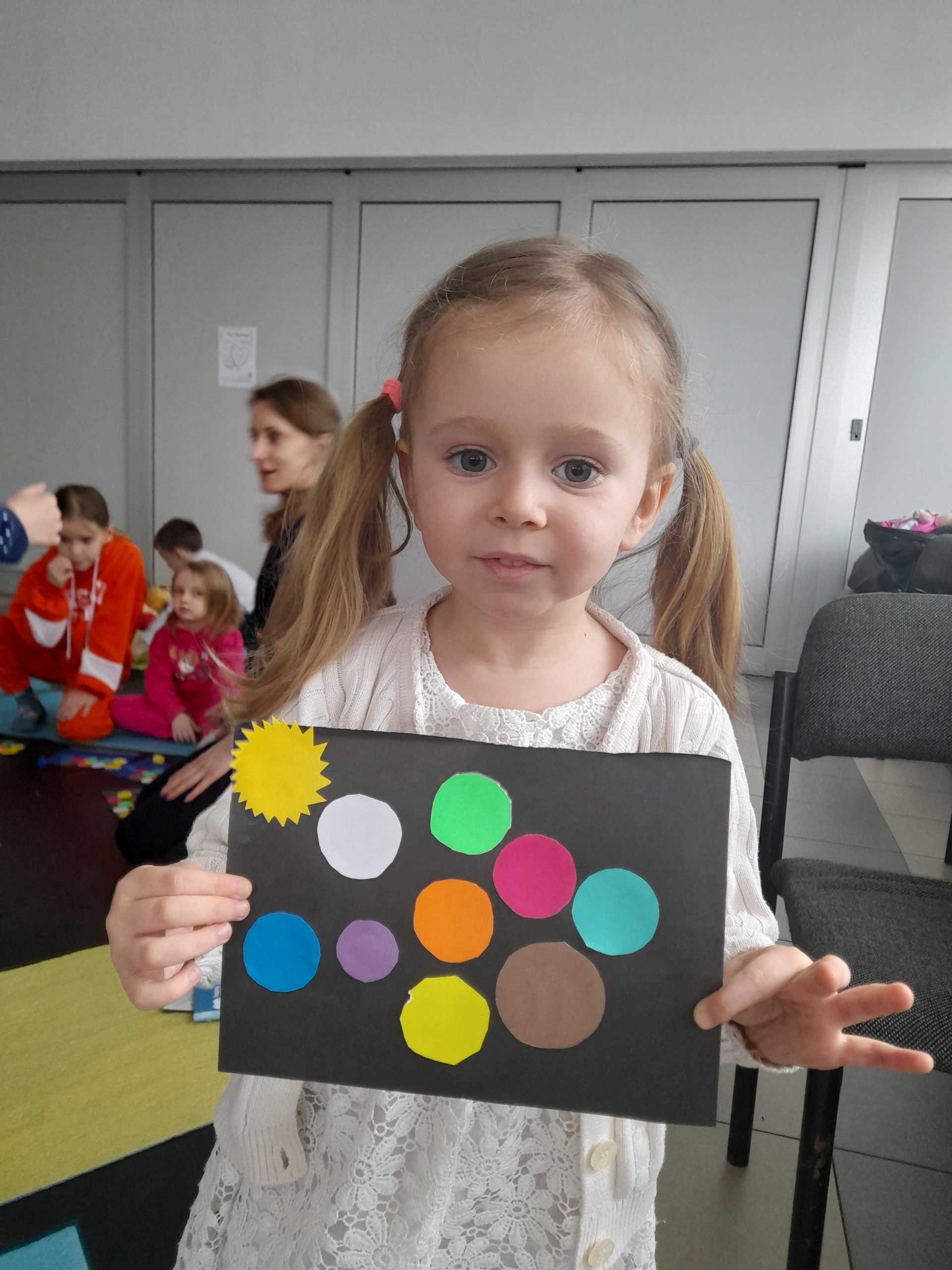
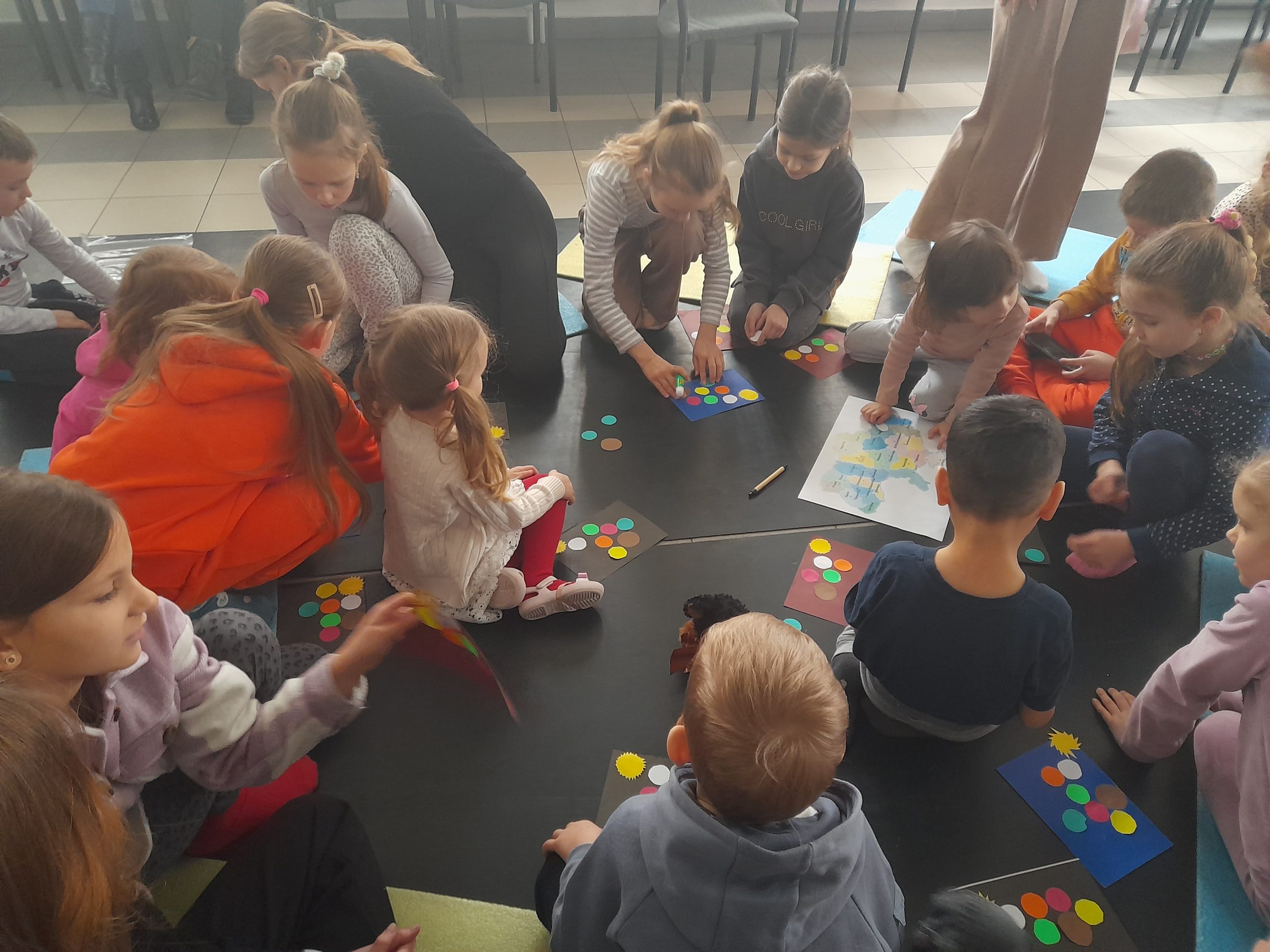
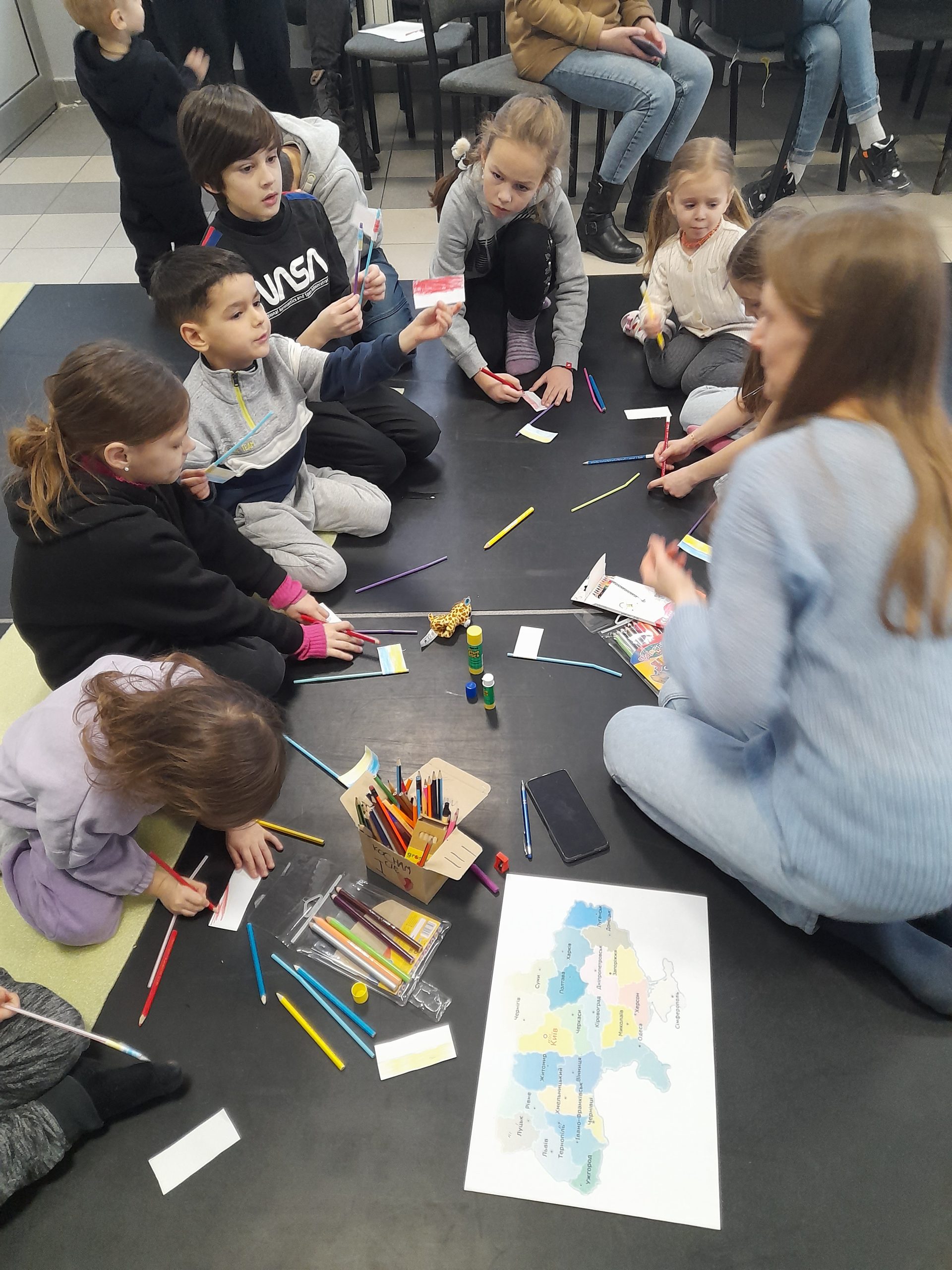
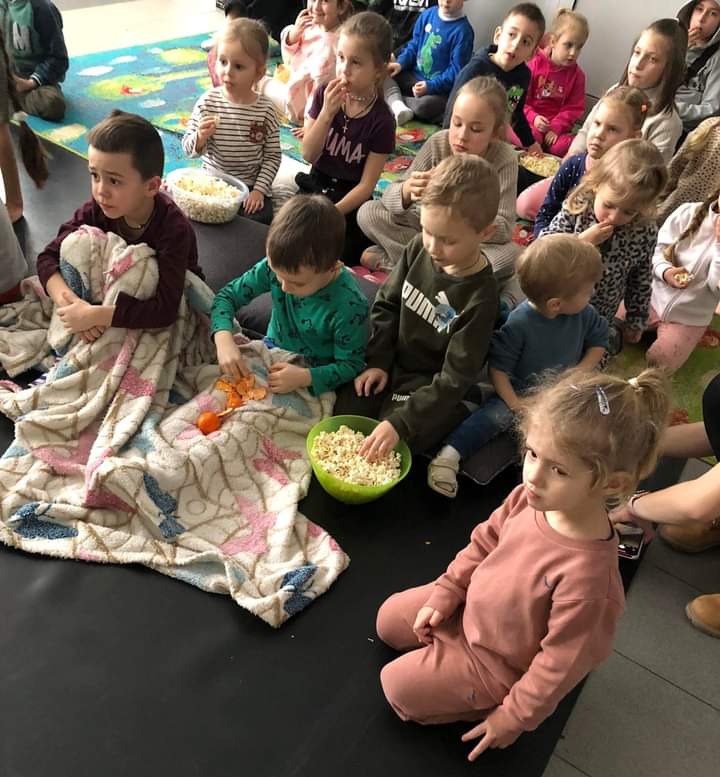
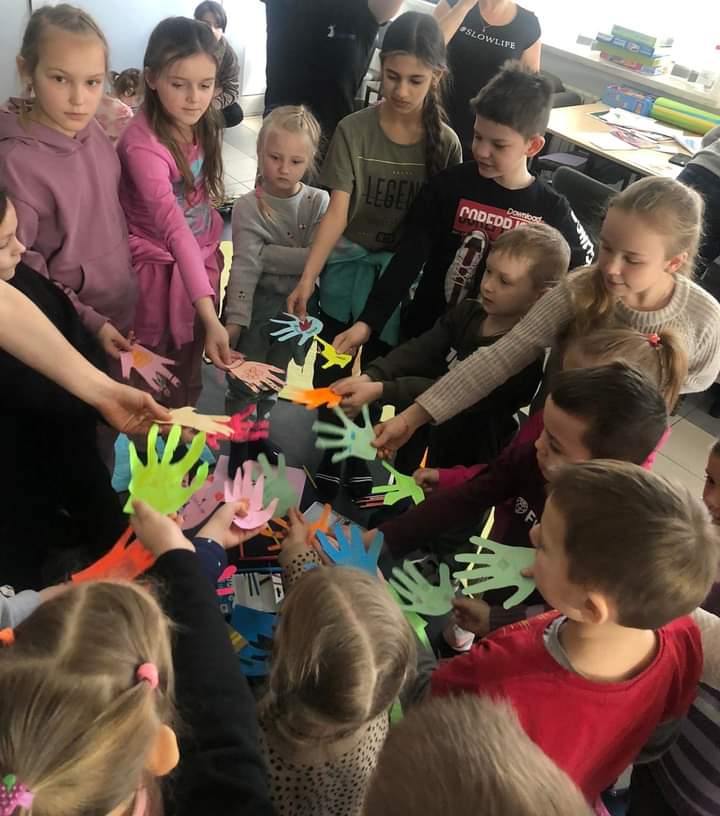
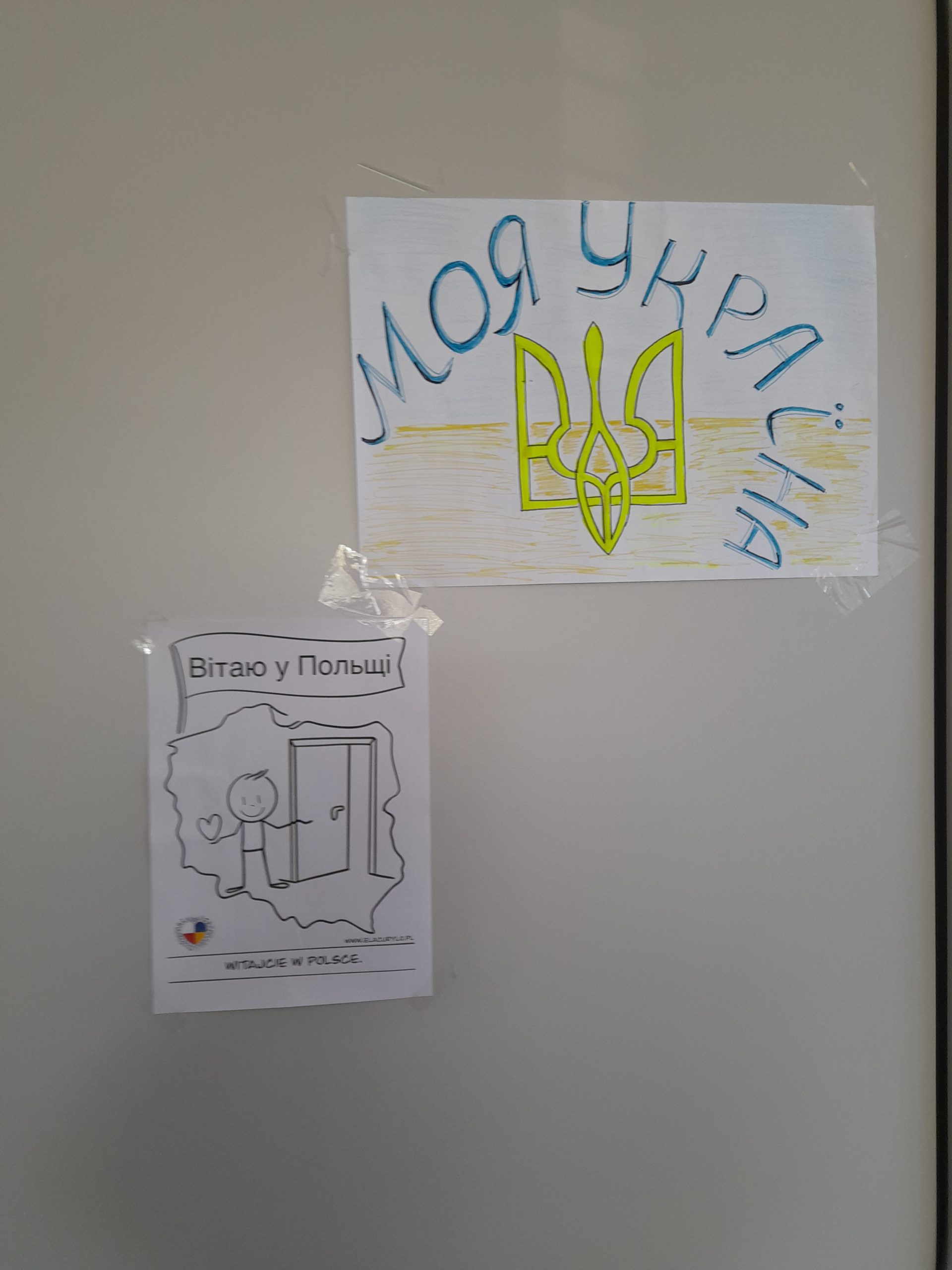
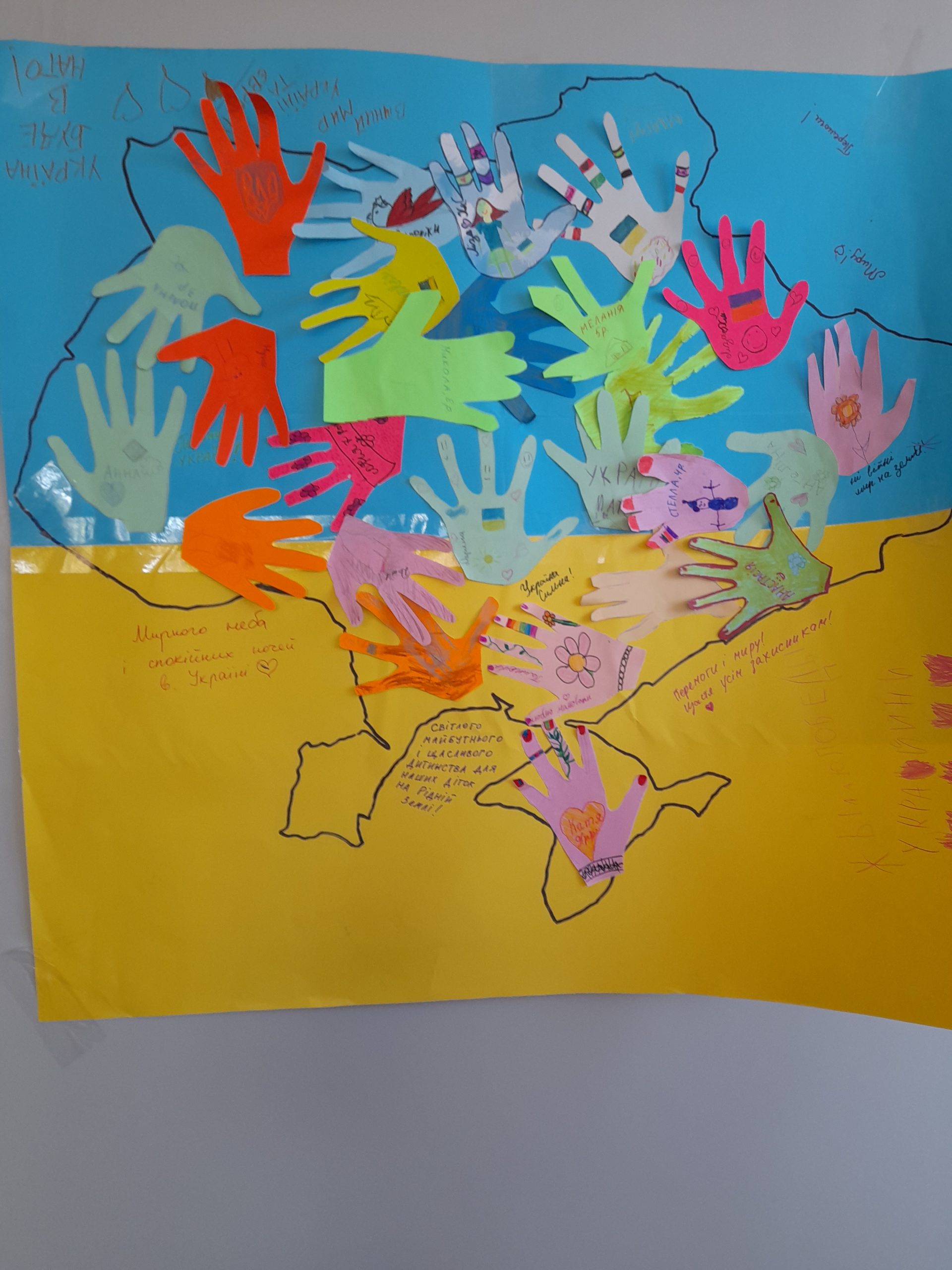
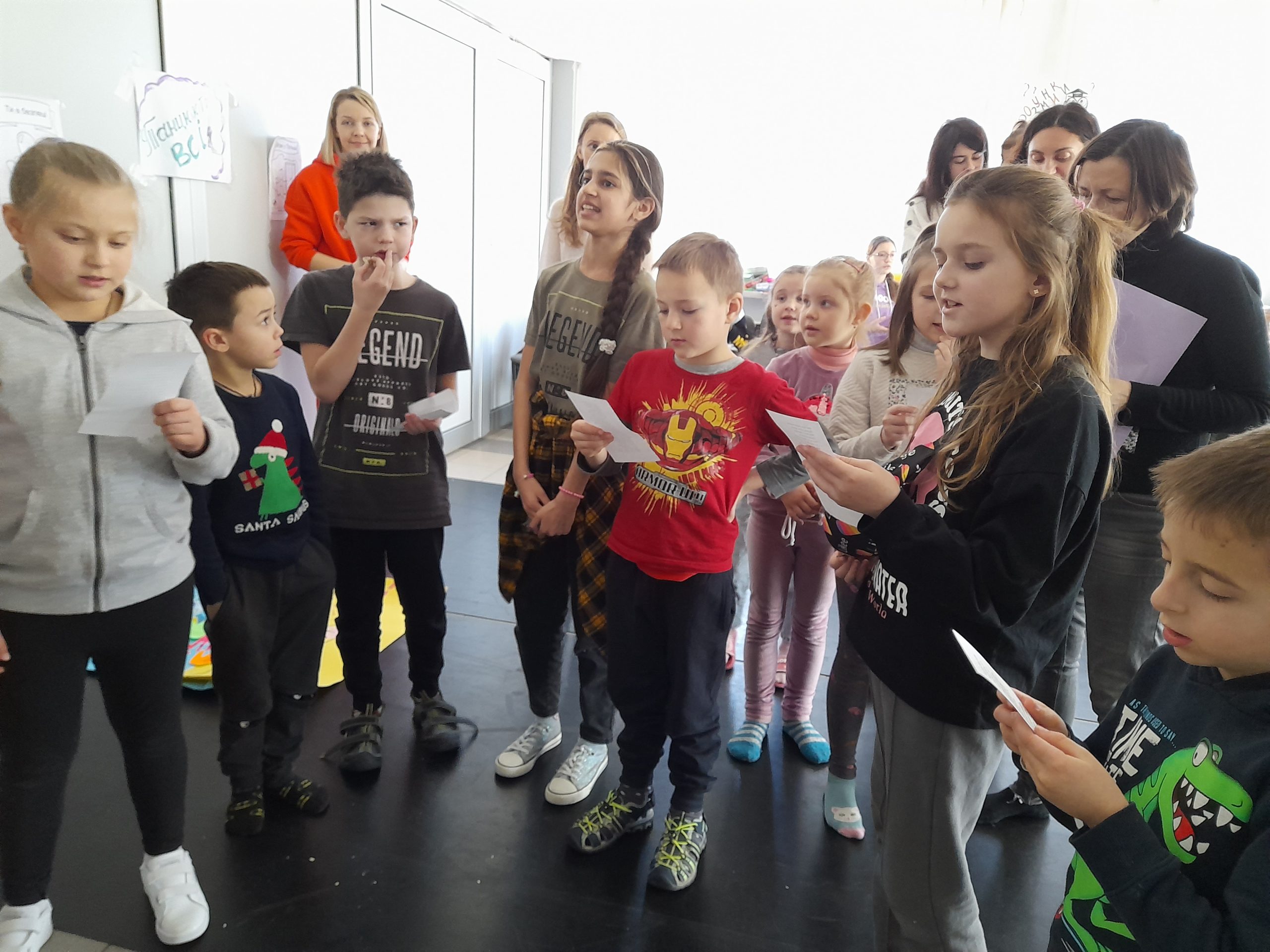
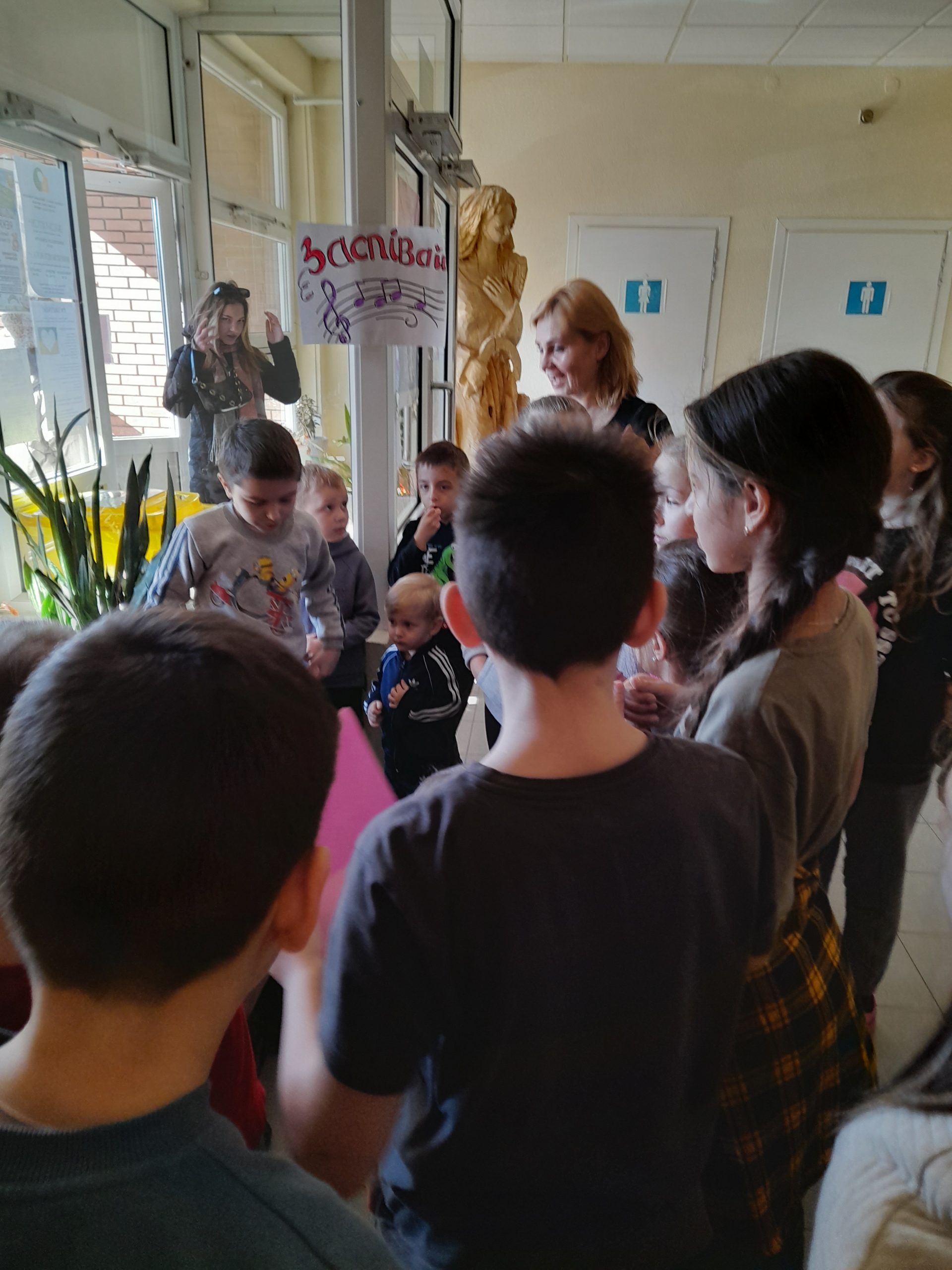
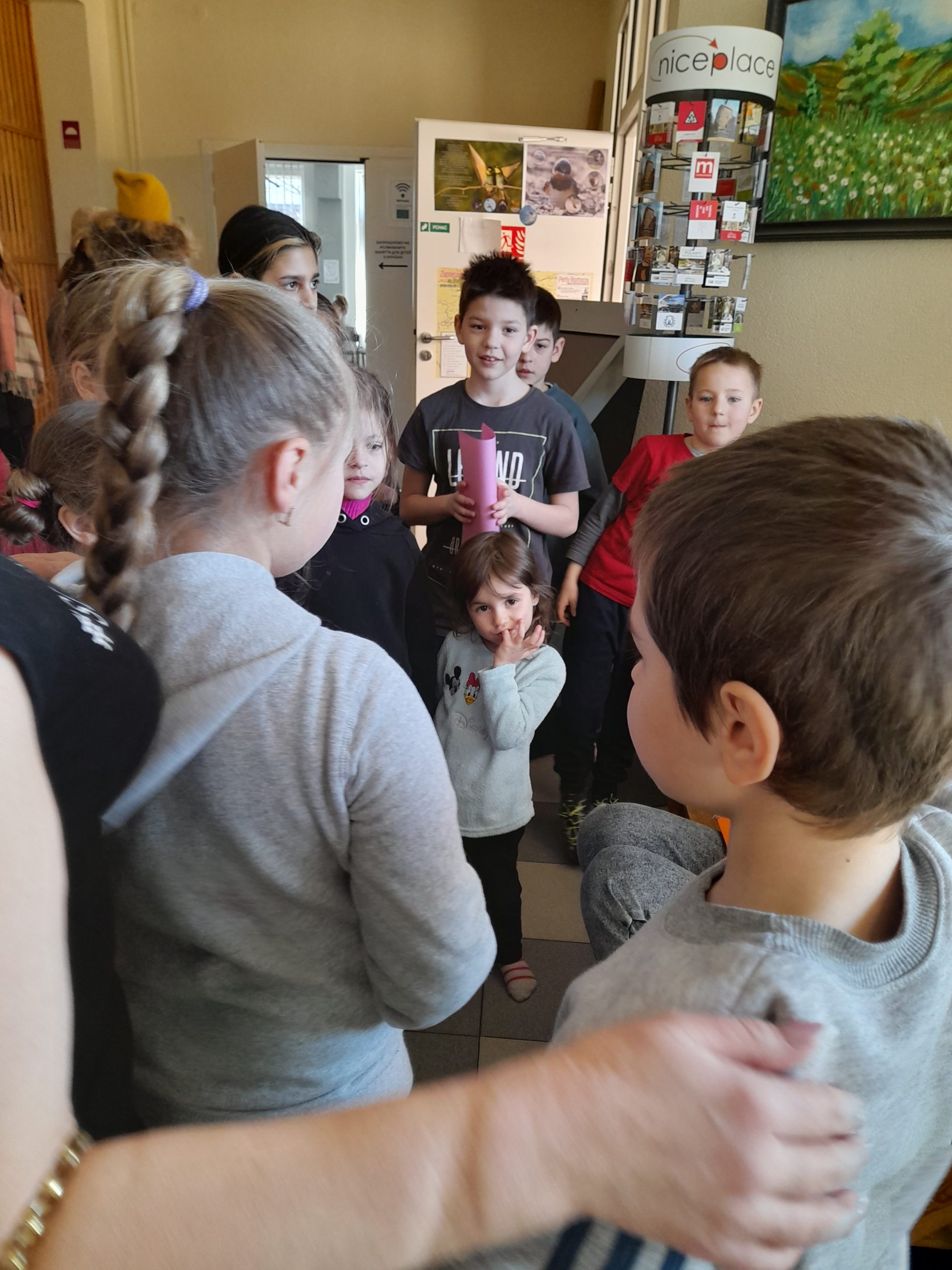
Location
“My” piece of Poland is Zwierzyniec – a small town in the Lublin province, called “The heart of the Roztocze National Park (Roztoczański Park Narodowy)”, located 30 km from Zamość, and… never conquered. Zwierzyniec is located 70 km from the border in Hrebennen (Rava Ruska). From a nearby town Hrubieszów trains go every day to Wrocław. They are fully packed from the very first station. Hardly any passengers alight on the first station. Most of the refugees go to the West, where their chances to find a job and to start a new life in Poland increase.
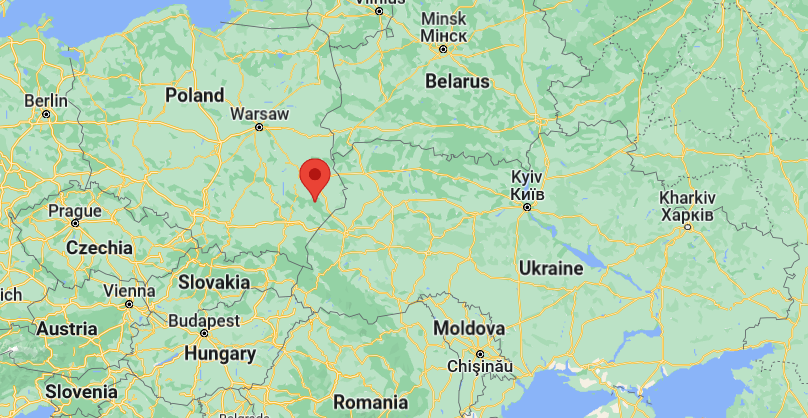
The border crossings in the Lublin province, through which the refugees come, are located in Dorohusk, Zosin, Dołhobyczow, Hrebenne. The railway crossings are in Dorohusk, Hrubieszów and Hrebenne.
The Ukrainian guests arrive by some private transport or by coaches or buses. The ones who travel by trains, usually decide to go further West.
Zwierzyniec is a touristic town. It’s active all year but most of the tourists come in the period from Easter to autumn. The residents owe some tourist houses. There is an orphanage in Zwierzyniec (the mentioned Villa Rózin) functioning since the Second World War, but was closed recently due to no need of locating children there. Now it may change… Although, there are some mothers with children staying there at present, they are to move when another place for them is found.
The Villa Rózin is a beautiful historic building with economic background, charming landscape, a football pitch and a playground. Although some refurbishing would be desirable, it could still be a wonderful house for the ones who are in need.
The first group of orphans that arrived here is staying in a village nearby, Kwęczynek. Three guardians take care of them and also us, the volunteers from Zwierzyniec come there. The place is admirable but it’s located “at the end of the world”. There is no reception there. If you need to call, you need to climb a hill! There is a little chapel. I look though its window. I see a message. I share it:
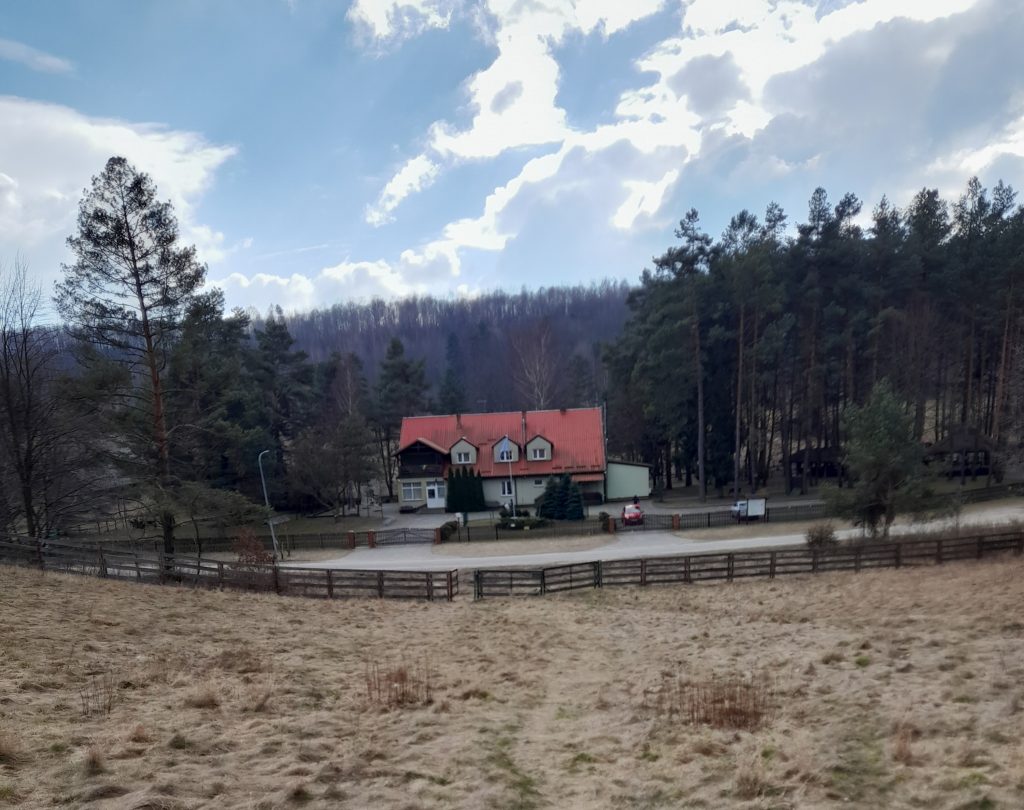
In an usual chapel in Roztocz
Let this revelation continue forever
From brother Albert’s good eyes
Take the example, incentive and inspiration
That you need to share heart like bread
And care for people who are brave
Be a friend to them all
This would be a real miracle!
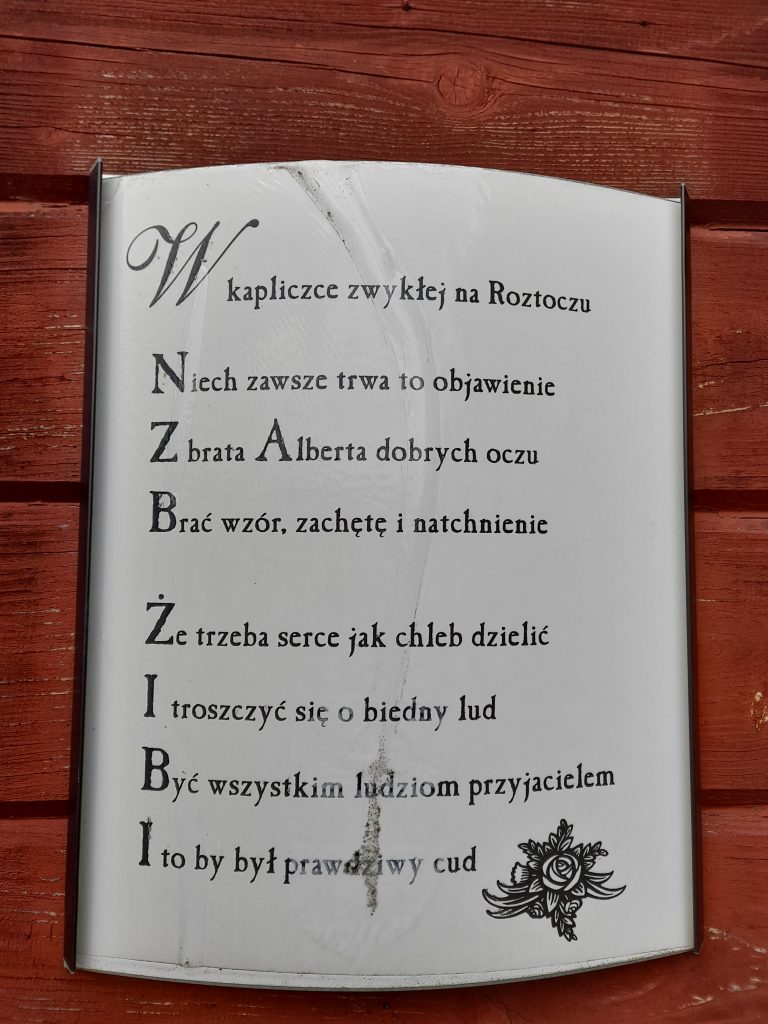
Translation: Agata Pempera
Polish version here.

Renata Jarecka
Studiowała filologię polską na Wydziale Polonistyki Uniwersytetu Warszawskiego oraz ukończyła zarządzanie w oświacie. Redaktorka, autorka wielu opracowań gimnazjalnych i maturalnych, m.in. w „Cogito” i „Victorze”. Pasjonatka głośnego czytania dzieciom oraz literatury dla dzieci i młodzieży. Od 2011 r. udziela się w kręgach edukacyjnych na obczyźnie. W 2013 r. zdobyła tytuł koordynatora programu „Cała Polonia czyta dzieciom”. Założycielka i przez osiem lat dyrektorka Polskiej Szkoły Sobotniej im. Niedźwiedzia Wojtka w Crawley. Współautorka podręcznika „GCSE. Nowe Tematy” wydanego przez Polską Macierz Szkolną w Londynie oraz autorka „Zeszytów Szkolnych. Egzamin A-level”. Od 2019 roku dyrektorka Szkoły Online, przygotowującej uczniów do egzaminów GCSE i A-level oraz do powrotu do Polski. Jedną nogą pozostaje w Wielkiej Brytanii, a jedną pomieszkuje na Zamojszczyźnie, skąd pochodzi. Mama pięciorga dzieci i… jednego bokserka.
